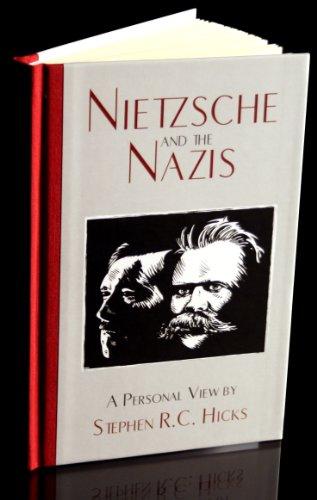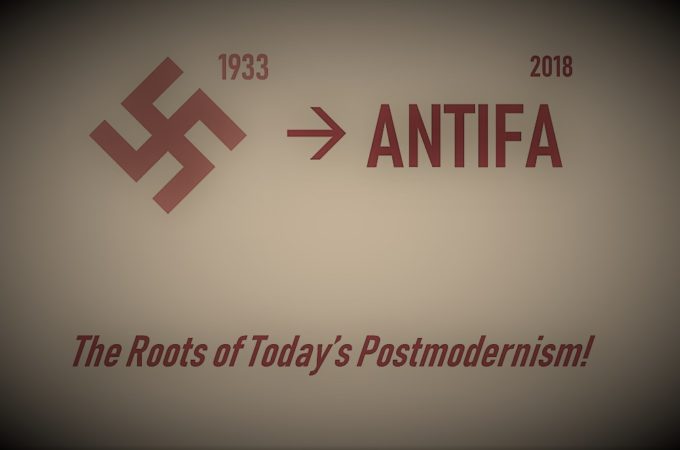Before there were postmoderns, there were Nazis. The 21st century phenomenon of postmodernism—in the streets, on university campuses, in legislatures and in the courts of law—has been a long time coming. It was the product of Jewish intellectuals, born as Cultural Marxism in the Frankfurt School between two World Wars. Ironically, those who laid the foundation for today’s postmodern thought were Jewish scholars who fled Germany to escape Hitler’s earlier manifestation of postmodernism, i.e. National Socialism.
 I recently read R.C. Hicks, Nietzsche and the Nazis (Ockham’s Razor, 2006, 2010). In many ways, Hitler’s paramilitary storm troopers were the precursors of today’s Antifa intimidation and violence. As I wrote in part one of this series, the current antiliberal safe spaces on university campuses are the progeny of book burning by German university students almost a hundred years ago. In this post, I mean to show the family resemblance between today’s postmodernist and yesterday’s Nazi. Our 21st century intersectional thinking, and its abandonment of reason, found similar expression in Germany in the 1930s, in at least two dimensions.
I recently read R.C. Hicks, Nietzsche and the Nazis (Ockham’s Razor, 2006, 2010). In many ways, Hitler’s paramilitary storm troopers were the precursors of today’s Antifa intimidation and violence. As I wrote in part one of this series, the current antiliberal safe spaces on university campuses are the progeny of book burning by German university students almost a hundred years ago. In this post, I mean to show the family resemblance between today’s postmodernist and yesterday’s Nazi. Our 21st century intersectional thinking, and its abandonment of reason, found similar expression in Germany in the 1930s, in at least two dimensions.
First, those in today’s intersectional groups of the oppressed have exchanged their own identity for that of their aggrieved community. Individuals are reduced to mere mouthpieces of the powerbrokers behind them. This is nothing new. As Hicks writes, in Nazi Germany,
Individuals were defined by their group identity, and individuals were seen only as vehicles by which the groups achieved their interests. The Nazis rejected the Western liberal idea that individuals are ends in themselves: to the Nazis individuals were merely servants of the groups to which they belong.[1]
Individual lives mean nothing
Hicks goes on to point out that individuals were nothing more than pieces of the whole, that is, instruments of the state:
Even within their own group, the Nazis did not see Aryan/Germans fundamentally as individuals. They saw them as members of the Volk, the German people, the group to which they owed service, obedience, and even their lives.
A second parallel between the Nazis and postmoderns is escape from reason. Postmodernism denies reason and reality. Emotions reign supreme, imagination replaces reality.
I always thought the Nazis were driven by rationalism, with little emotion. Those assumptions were completely wrong. The Nazis thought the world’s problems were generated by individuals thinking for themselves. Free thinkers must be silenced. Their books, the written legacy of their thoughts, must be burned. Reason must be crushed by passion.
What Germany required was passion, a storm of emotion arising from deeply rooted instincts and drives: [quoting Hitler] “Only a storm of glowing passion can turn the destinies of nations, but this passion can only be roused by a man who carries it within himself.” Consequently, German training and propaganda were not directed toward presenting facts and arguments but rather to arousing the passions of the masses. Reason, logic, and objectivity were beside the point.
Hicks notes that the German philosopher Fredrick Nietzsche begat many of the Nazis’ ideas.
Both [Nietzsche and the Nazis] are fundamentally irrationalists—they do not think much of the power of reason, and they urge themselves and others to let their strongest passions and instincts well up within them and be released upon the world.

Emotions trump truth
Like their predecessors the Nazis, postmodernists elevate feelings and instincts over reason. When the Judeo-Christian concept of objective truth and moral structure is denied, what is left is the will to power.
If you want to understand the ideas behind Hitler and the Third Reich, read Hicks’ book. There you will see many of the ideas fueling postmodern culture today.
As Solomon noted, there is nothing new under the sun.
- Darrow Miller
[1] All quotations from Nietzsche and the Nazis by Stephen R.C. Hicks, (Kindle Locations 1651-1659). Ockham’s Razor. Kindle Edition.







2 Comments
Jose Curiel
October 15, 2018 - 9:26 amExcellent thoughts Darrow. That is exactly what is happening to our cultures today. The church seems to flowing with it unaware of the danger.
admin
October 16, 2018 - 7:16 amThanks Jose
It is the “in thing” for much of the church in the USA today.